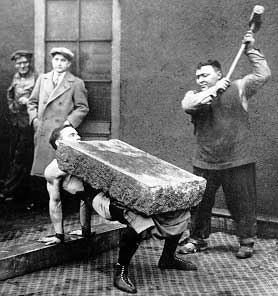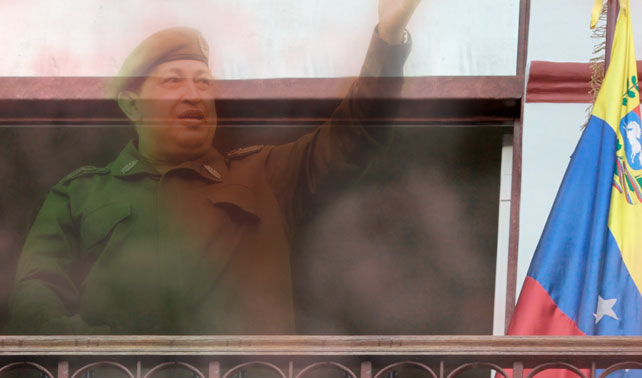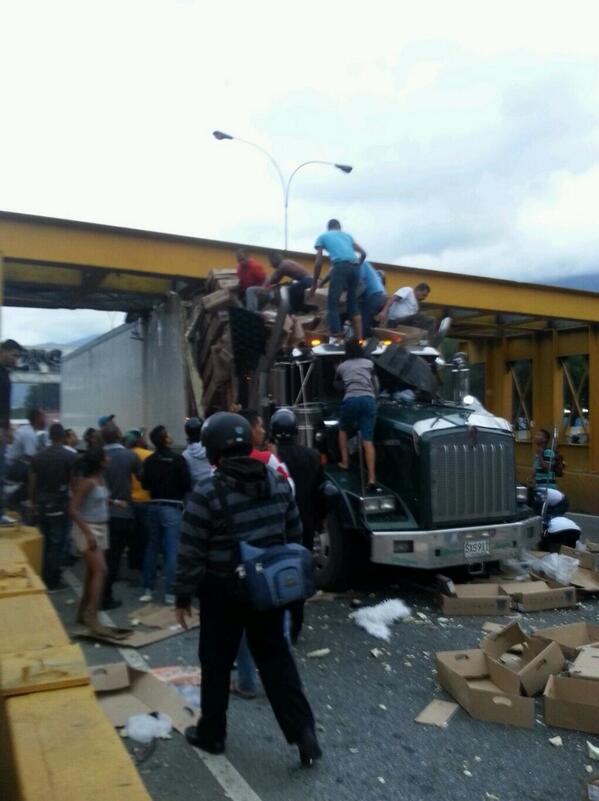
For the last few days I was mulling a post on how long the chavista regime could survive. (Note: that it survives a week or ten years is not the real point, what we are discussing here are the means it uses for its survival).
But Miguel sort of hopped ahead even though his post is lacking addressing the motivation of these people "[they have] no scruples". Really..... Still, Miguel covers quite well how the regime can muddle his way through financially for quite a few more months or years, and thus there is really nothing I can add on this respect. However, on other aspects there is a whole lot more that can be added as to reasons why the regime may survive longer than logic would dictate.
To understand what comes next it is good to remind that the regime is a thug-ocracy, that those in charge are a whole bunch of people that have stolen so much that they know perfectly well that if the country ever gets back to normal they will go to jail. In other words, the people in charge cannot conceive any scenario in which a peaceful transition will come and they will be allowed to go unscathed. As such they are ready to do whatever it takes to stay in office. Murder not being an exception since the already existing high crime rate would allow for an "oops! Capriles was unfortunately shot dead when someone tried to steal his blackberry" (ten cases a day in the country, just replace "blackberry" by smartphone X and "Capriles" by your favorite political leader, journalist, neighbour, etc.)
If plural murder and bloody repression
á la Syria have not taken place yet it is indeed in part because of the oil money still coming in. It might be seriously diminished but at 100+USD a barrel there is enough to smooth over the most pressing issues, or at least to throw enough bones to postpone the day of reckoning. But there are many other reasons why the regime is not going to crumble: simply there is no will to push it over the cliff. Many culprits here.
The military is the very first group that have allowed the country to become the cesspool of corruption and incompetence that it has become. Not that I am advocating, by any means, a coup: those that would perpetrate a coup are simply scum, worse than Maduro and his combo. And also, for all practical purposes, WE ARE ALREADY UNDER a military regime anyway, albeit one that did not need to make a coup in its grab for power. Chavez served it on a platter to them.
What I am referring to is to is what should be a serious military, one that is able to express discretely its concerns on delicate issues and tell any government which are the No-Noes on national security issues. For example, a serious military would have opposed the conversion of the country into a narco state. It would not have allowed Cuban meddling beyond medical and sports personnel. It would not have given up the Essequibo region under claim against Guyana. Certainly, it would have allowed some corruption, land expropriations, constitutional violations, and the like that are civilian responsibility; but at least on matters of national security it would have drawn the line. What is damming in the military silence and collaboration is that the consequences are synergistic: corruption, independence, incompetence are much more damaging than if the military had had the good idea to stay clear of Chavez, which it could have, even after the 2002 fiasco.

To hope anything from the military today, as many still pretend, is simply delusional. The Venezuelan military has allowed himself to become a political body, deeply flawed, deeply corrupt, probably irrecoverable. A new government will have the painful decision to either confront them and eliminate the army, or to allow the same dependency to continue. And as a narco state which has absolutely no qualms whatsoever, I am afraid that we are doomed. The only thing we can hope is that the military gets tired of the general decrepitude of the country and allow a change in its leadership as long as its privileges are preserved. I suppose, in a way, that could be seen as an improvement on our current conundrum.
The second group is the judicial system. That it has allowed itself to be co-opted as it did will remain one of our biggest historical shame. That what has happened to a couple of judges, one of them being judge Afiuni, was enough to silence the thousand of justice workers is simply incomprehensible. True, it happens in many dictatorships where the judicial system offers meek, if any, resistance, from Chile to Germany. But those dictatorships were of the "right" nature as "left" dictatorships usually removed judges outright and that was that. Venezuela will be the text book case on how leftists regimes can take over a judicial system without much trouble. Now we even see pitiful images of a formerly respected legal scholar, Rondon de Sanso,
writing cheap panegyrics on Chavez, and
even circumstancial poetry, I suppose to defend indirectly
her hyper corrupt son in law, Rafael Ramirez. She went even as far as
saying outright that not everybody deserves the right to a defense. Not only the Venezuelan judicial system has become a dead weight for recovering democracy, but its mere passivity is enough to help the criminals in office without needing much active support from tribunals.
The third group is the beneficiary of direct, massive corruption. It may not be that big, it may even include people that would normally vote against the regime, but it has power in that it can finance politicians it need to preserve its privileges. The problem with these people is that they have stolen so much that they cannot care less anymore about what happens to the country. Let's take the latest example of the "bolibourgeois" of
Derwick Associates who have overpriced power generating gear, stolen, let's not be afraid of words here, hundreds of millions of US dollars. Does anyone think that the kids that stole such amounts care one way or the other if people starve in Venezuela? If civil war starts? No.
All their actions in defending themselves of the charges indicate that they are trying to find ways to steal yet more millions.
But the last group is the largest one and the most worrisome of the lot. To really have a sense of that group you probably need to live outside of Caracas, and to have regular contact with some sectors of "
el pueblo". What casual and not so casual observers are failing to grasp is that some of the abuses and inefficiencies of the ruling chavismo are increasingly perceived as "normal", the ways things are and should remain. In short, after 14 years of pseudo revolution and misrule, a large chunk of the chavista vote has become a conservative vote, in the stricter sense of the term, to keep the
status quo, to have a knee jerk refusal of any change.

It is difficult to characterize this group, even more to label them no matter how many labels one tries to make up. The fact of the matter is that these people got used to live in the situation they are, developed survival mechanisms, and are acutely aware that any change will take years to improve their lives. For example, the work situation. For many people outside of Caracas it is clear that there are no jobs out there worth applying to. The private sector has all the trouble in the world to maintain its payroll, or is trying hard not to increase it considering the new prohibitive labor law and regime bias against employers. Simply put, if you have not belonged to a real payroll in the last 2-3 years it is almost impossible for you to get a job, even inside government as these jobs are reserved for the increasing number of "graduates" from bolivarian "universities" with mickey-mousy degrees. However you can still have access to Mercal and other freebies as long as you keep voting for chavismo, or so you were convinced to do. Basically, for the average familial units of that group, life depends maybe from a single meager income, the others share in and stand in line for the occasional freebies.
Standing in line.... This has become a national sport. The habit seems to be now ingrained and I am getting tired of seeing those lines all the time, even at working hours which tells you volumes of the job scarcity. But what is worse is that people have stopped complaining, and not only they are taking it in stride but apparently they have no problem spending the night in line to make sure that they get a number for next day, or the day after even. That magical day after number ensures that they will get something (meat? oil?) that they cannot get in the "normal lines" (corn flour? margarine?).
I do not know how to explain this social phenomenon that the opposition is careful not talk about because there is little they can do. But for many Venezuelans now it has become "normal" to stand in line for anything they need, from food to medical care, with the aggravating factor that manyseem unable to link that with the economic failure of the regime. This is what gradualism and 14 years of brain washing and media restriction do to a country, a new "normalcy".
Thus we reach the end of this post. What I hoped to convey is that there is a gigantic inertia against regime change. Maduro benefits from a large group of people that may not be happy with their lot but who for many reasons see no point in changing the way things are. Note that I did not discuss those who actively fight to block any regime change such as the talibans, the politicians that now they have no future if they find themselves in the opposition, those who vote for Chavez for some obscure need for revenge, etc... I am only talking of those who actually could do something but chose not to do so.
True, the social situation is explosive, polls are falling fast for Maduro (for a regime based on the charisma of Chavez a 2 point poll drop is like a 10 point drop in a normal democracy). There are also many potential fuses to provoke the social explosion, or merely an electoral reversal so big that not even fraud can keep the corrupt combo in office. However there are enough factors dampening the fuse that even if one of them were to be lighted up there is no telling when its effect could be felt. Maduro could last until December or for the full six years terms. He can fall bumped out by the opposition or by an internal chavista conspiracy. There is simply no telling. What is certain is that there is an unexpected inertia in his favor. Not love, but the next best thing for a politician, inertia.














